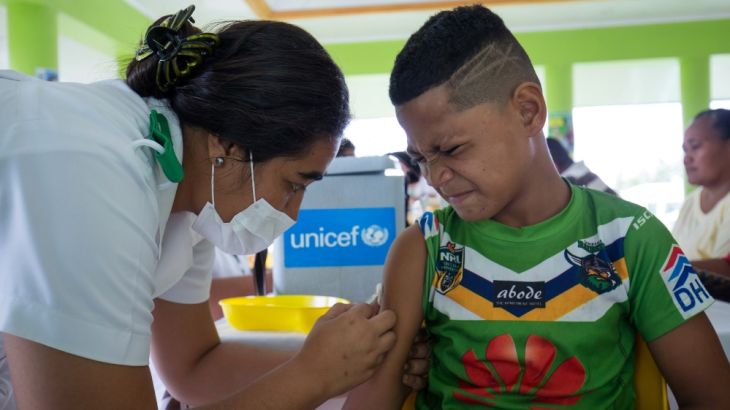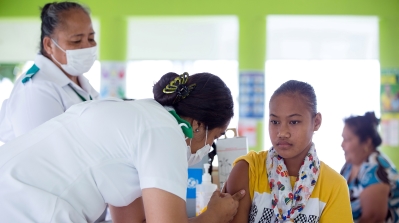Samoa shuts down in unprecedented battle against measles
Roads empty as medics go door-to-door to administer vaccines in country where 62 have now died from deadly disease.

Samoa began a two-day shutdown on Thursday as authorities embarked on an unprecedented mass vaccination campaign to contain a deadly outbreak of measles that has killed 62 people, mostly small children, in the Pacific island nation.
Officials suspended non-essential government services to allow civil servants to support the vaccination drive, and ordered all businesses to close. Inter-island ferry services were also cancelled.
Keep reading
list of 3 itemsSamoa makes measles vaccine mandatory to stop deadly outbreak
Measles cases triple around the world, WHO warns
Residents were advised to stay in their homes and display a red flag if they were not yet immunised as vaccination teams went to work across the nation of 200,000 in the early hours of the morning.
“No one is being permitted to drive unless they are going to hospital or they have special permission,” Al Jazeera’s Jessica Washington said from the capital, Apia. Behind her wide streets were all but empty of people and cars.
“The ban is to make it as simple as possible for the medical teams to travel throughout Samoa and access as many families as possible.”
Just vaccinated! 2000 people have been immunised in #Samoa since the mobile vaccination service began a few hours ago – including brave Faith and her parents. #SamoaMeasles @AJEnglish pic.twitter.com/i8flIzUqxc
— Jessica Washington (@JesWashington) December 4, 2019
The operation, carried out under emergency powers invoked as the epidemic took hold last month, is a desperate bid to halt the spread of the highly-infectious disease.
On Thursday, the government said 165 cases had been reported in the last 24 hours, as the death toll rose to 62. Of the dead, 54 were babies and young children aged four and under.
“I’ve seen mass mobilisation campaigns before, but not over an entire country like this,” UNICEF’s Pacific Island chief Sheldon Yett told the AFP news agency.
“That’s what we’re doing right now. This entire country is being vaccinated.”
Karen Page, who works with the New Zealand Red Cross, was helping out with the vaccination on Thursday.
Page told Al Jazeera that everyone understood the urgency of the situation.
Her team’s goal was to vaccinate as many as 200 people during the day.
“Not one person has not wanted to be vaccinated,” she said. “As more people are vaccinated, the numbers of those infected are supposed to drop.”
The measles vaccine needs about two weeks to take effect.
Red flags
Immunisation rates in Samoa were about 30 percent before the outbreak and have risen to more than 55 percent since the start of the mass vaccination campaign two weeks ago.
Yett said the aim of this week’s two-day drive was to push the rate above 90 percent, which should help curb the current outbreak and stop future epidemics.

Even Prime Minister Tuilaepa Sailele Malielegaoi’s residence had a red flag fluttering outside it, with the leader saying his nephew had recently arrived from Australia and needed a measles shot.
“Our people are more conscious now than before that having your children vaccinated is the only way,” Malielegaoi said.
Children are the most vulnerable to measles, which typically causes a rash and fever but can also lead to brain damage and death.
The latest figures show infants accounting for most of the 4,217 cases recorded since the outbreak began in mid-October.
There have also been measles epidemics in neighbouring Fiji and Tonga, but higher immunisation rates mean they have been more easily contained, with no fatalities.
With additional reporting by Manar Al Adam in Kuala Lumpur.